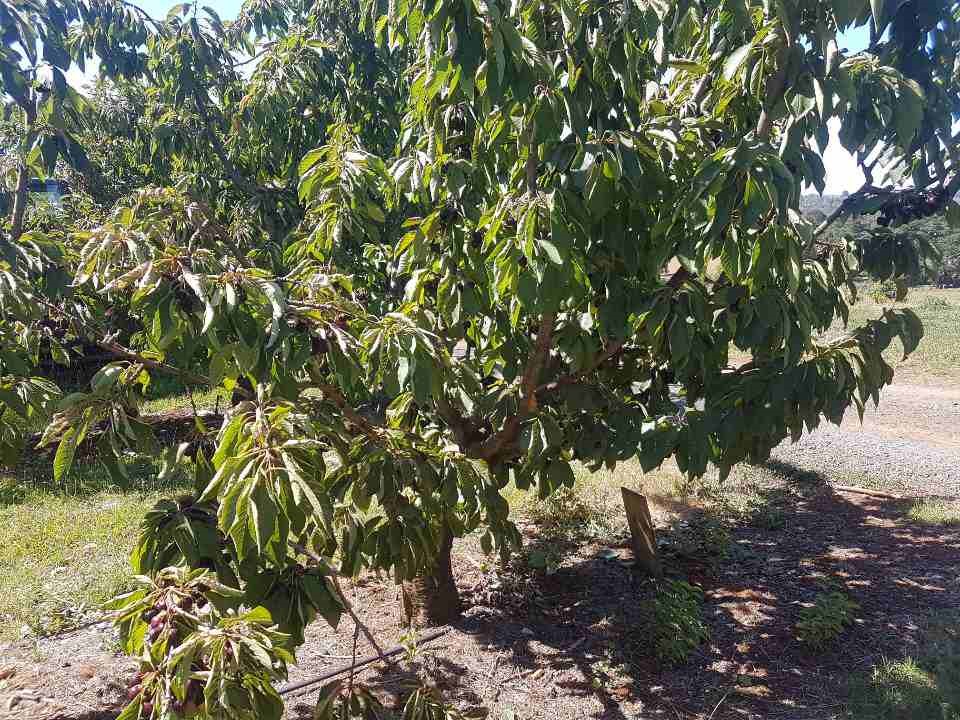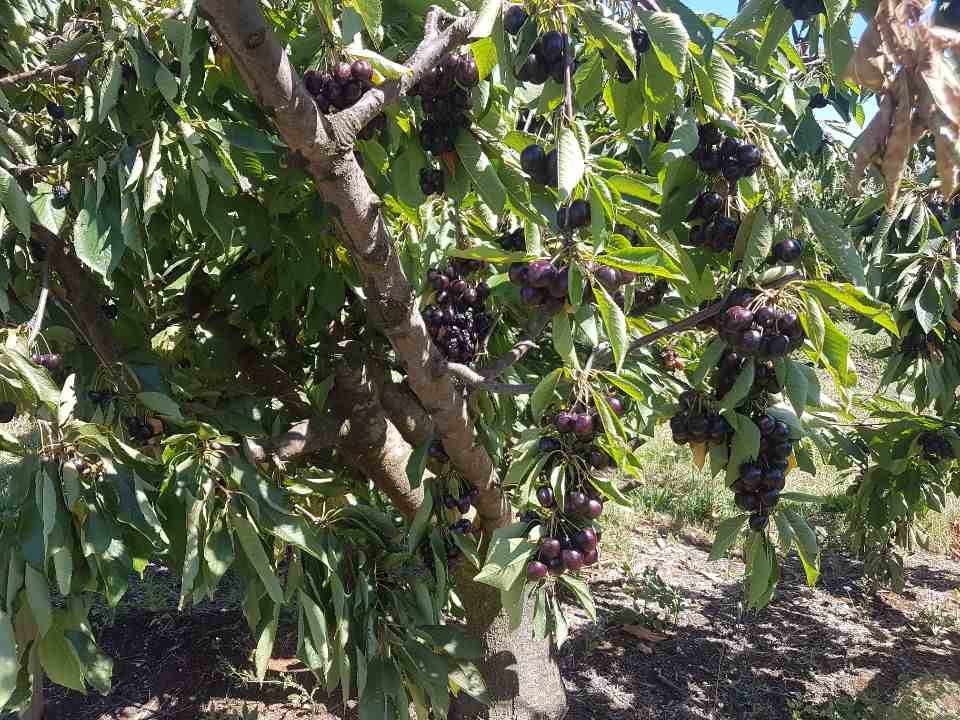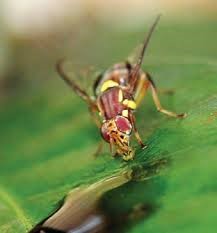By Bronwyn Koll, Yarra Valley QFF Action Plan Coordinator
As cherry harvest for the season ends, the pressure from Queensland Fruit Fly (QFF) can increase due to continued warm weather and increased breeding opportunities, hence a possible increasing QFF population.
Any cherries left on the tree after harvest are attractive to QFF. In areas where QFF are present, prevention and control measures should continue to be implemented for several weeks after harvest to reduce QFF risk in the region.


Picture: Cherries left on the tree after the harvest period are attractive to Queensland Fruit Fly. Fruit requires removal to decrease QFF risk, or continued protection from a QFF management program.
Prevention and management tools are;
Using a combination of prevention and management techniques improves the likelihood of reducing QFF risk to the orchard. Hygiene and baiting are the preferred management options having the least impact on the orchard system, as the use of a cover spray option requires consideration of other orchard production goals.
Why continue the prevention and management program after harvest?
As for many orchard pest insect populations, orchard hygiene after harvest is a crucial management factor to ensure QFF populations do not have any opportunity to build up in the local area and impose on the following season’s cherry production. Continuing good hygiene practices after cherry harvest also protect the up and coming round of ripening crops on the orchard or in the region. e.g. plums and late summer fruit, pome fruits, persimmons and figs. This is important even if no QFF were detected during the cherry season, as QFF populations could be on the increase.
As QFF prefer to lay eggs in hanging fruit, removal and destruction of the residual cherries from the orchard is optimal to prevent QFF breeding.
Damaging the fruit on the ground using machinery to squash or roll the fruit, or a combination of raking and squashing can also reduce the opportunity for larval survival in any infested fruit. Any fruit damaging method that is available can be applied, the idea being, the quicker the fruit can be dried up (on the tree or on the ground), the better.
Protein baiting continued beyond the last harvest, until after the last of any fruit left hanging are completely uninhabitable by QFF, is important for reducing the QFF population. Extended use of protein baiting is considered a useful post-harvest tool because any surviving larvae in the remaining fruit could then pupate in the soil for approximately 10 days (temperature dependent) and then emerge looking for the protein feed that they need to mature.

Picture: A protein baiting equipment set up for use in a Queensland Fruit Fly management program.

Picture: A Queensland Fruit Fly eating protein bait in a leaf (photo credit - Hort Innovation Australia).
Cover sprays are part of the orchard’s available options for QFF management. Before using cover sprays, carefully consider their use depending on a risk assessment of the individual situation. Agronomy advice is recommended when applying chemicals for QFF management.
A frequent look at the non-commercial fruit around the orchard, such as the family’s home garden and any host trees bordering the orchard, is another important job for QFF prevention and management. Cutting the fruit into fine slices and checking inside for larvae can help raise awareness and trigger increased action if QFF is present. Fruit in the home garden should also be regularly harvested and not left hanging to aid in the reduction of the regional QFF risk.
Yarra Valley Cherry growers can contact Bronwyn Koll, Yarra Valley QFF Action Plan Coordinator on 0490381999 or
Australian farmers and businesses will continue to reap the benefits of Australia’s free trade agreements with further tariff cuts set to boost Australia’s competitive advantage in two of our major export markets.
Minister for Trade, Tourism and Investment Simon Birmingham said the latest round of tariff cuts on January 1, 2019, under Australia’s trade agreements with China and Korea would build on the substantial economic benefits these two major agreements had already delivered for Australian exporters.
“China and Korea are two of our largest trading partners, and these tariff reductions will provide a significant boost for Australian businesses looking for export opportunities into these markets,” Mr Birmingham said.
“With Australian goods exports to China already totalling $106 billion, this latest round of cuts means tariffs have now been eliminated on 5418 products and give Australian exporters an even greater competitive edge in the Chinese market. - Read more of this Good Fruit & Veg article.
Those of us who have been enjoying some beautiful Australian cherries over summer would be largely unaware of the very significant challenges mainland growers face when it comes to exporting fruit.
Cherry Growers Australia president Tom Eastlake farms in the NSW district of Young and said non-tariff trade barriers had been the most pressing issue for the mainland industry for more than two decades.
He said free trade deals touted as ‘big wins for cherry growers’ had in fact delivered no improvement in market access for mainland growers who faced export restrictions due to pest concerns.
“Those free trade deals didn’t do anything for us,” he said. - Read more of this QLD Country Life article.
Growing concern over the exploitation of workers in the agricultural industry led to the South Australian, Queensland and Victorian state Governments conducting enquiries into the use of labour hire. Recommendations from those enquiries resulted in the introduction of similar, but subtly different labour hire regulations requiring licensing of labour hire providers in each of the three states.
Victoria: The Victorian Labour Hire Licensing Scheme is a new business licensing system that protects vulnerable labour hire workers from exploitation and regulates the provision of labour hire services. Certain administrative provisions under the scheme have begun, but licensing is not yet in force.
Compliance obligations for labour hire providers and users, including those relating to licensing, are not expected to begin before early 2019. The commencement date for these obligations will be announced well in advance and will include information about the transition period for applying for a licence.
Further information: https://labourhireauthority.vic.gov.au/
Source: MADEC
As well as changes to make it more attractive for working holiday makers to stay for longer on farms, the Commonwealth Government also introduced changes to make the Seasonal Worker Programme even more attractive to growers.
-From the 5th of November 2018, seasonal workers from all countries will be able to work for a period of up to nine months in Australia (up from the existing six months), but must spend three months out of every twelve in their home country.
-Growers will only have to contribute $300 toward the airfare cost for each worker instead of the current $500.
-Labour market testing must run for a minimum of two weeks and the results will be valid for six months from the date the advertisement was removed rather than 3 months as it is now.
So the takeaway message is there are lots of changes either underway or soon to commence. For further information or to source harvest workers, contact the Harvest Trail – 1800 062 332
Source: MADEC
Given the importance of backpackers for picking and packing fruit crops, the Commonwealth Government has recently announced some changes that will make it easier to find backpackers who want to work on farms and enable them to work and stay longer in Australia. The main changes are:
-From the 5th of November 2018, expanding the regional areas where 462 visa holders (China, Indonesia, USA, Chile, Argentina) can work to get a 2nd year visa extension – currently they can only get an extension by working in northern Australia.
-From the 5th of November 2018, 417 and 462 visa holders can work with one employer for 12 months, an increase from the current 6 months.
-After the 1st of July 2019, 417 and 462 visa holders will have the option of getting a third year visa if they do six months of specified work in a rural area.
-Progressively increasing the country caps for some 462 visa holders.
-Increase the age of 417 visa holders from Canada and Ireland to 35.
The key focus is on providing immediate access to workers in key rural areas. Employers will be able to retain trained and experienced employees for up to 12 months, rather than the previous six months.
Source: MADEC
and return it to: VCA Secretary, PO Box 612, Mooroopna, 3629
Web design by Fruit Tree Media